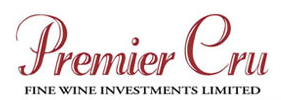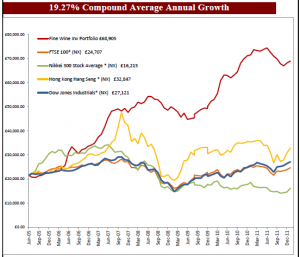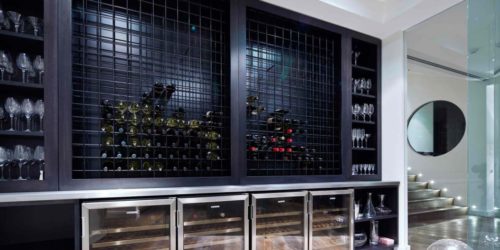Interview with Paula & Stacey Golding / Owners of Premier Cru Fine Wine Investments (Europe’s 1st Wine Investment House)
Paula and Stacey, many thanks for taking the time to talk to us here at 12×75.com
You are the formidable mother-daughter team that owns and operates Premier Cru Fine Wine Investments. I suppose my first question would be:
Paula: ‘What’s it like to be business partners with your daughter?’
Most of the time it is wonderful, I just have to remember not to wipe a crumb off her like any mother would, sometimes I forget and she is not too pleased; she says “I am a powerful working woman and then you do something like this”. We give each other respect and it isn’t until we leave the office that I can wipe that crumb without getting told off
Stacey: ‘What’s it like to be business partners with your mum?’
Great, we have been working together for most of my professional career and it suits me. I am a very passionate person and often go at 100 miles an hour from the beginning to the end without much of a middle and she grounds me, pulls me back and starts filling in the gaps. It works because (a)we are equal in the office and revert to mother and daughter outside and (b) our skill sets are different, we respect this and work to our strengths. Besides someone has to put up with me and my singing; it is terrible and I do it a lot.
Paula: ‘So you started Premier Cru in 1992 – what made you decide to start a Specialist Investment House that solely focused on one product – fine wine?’
You have to know your investment subject inside out (I prefer my wine inside me, but that’s another story), and as Bordeaux has such a long financial history and is not as volatile as Burgundy, we had a lot more information to study.
Stacey: ‘Why did you not want to become a wine merchant, and in your opinion are there benefits to being a company that just focuses on Investment Grade Wine?’
Until we entered the market there were no Companies that specialised in investment alone. Our model was to be able to offer tailed specialist advice to investors and not the existing wine community – we are not competition to the existing wine trade.The whole point of not being a merchant first is that it allows us to offer independent advice. The business model of a wine merchant is that they have to sell their stock, in a timely fashion. It therefore stands to reason that the wines recommended by a wine merchant must come from the selection they are holding. Although this works well it is always better when the choice is wider and bears no direct impact on the adviser. As the wines we choose for clients are purchased on their behalf for them alone the choice is tailored to their specific investment needs and is not constrained in any way. The circle of benefit is completed with us needing to buy our freely chosen wines. There are all sorts of other benefits but the obvious one is the wine we get to drink!
There were a surprising amount that were really helpful, some were sceptical but all wished us well. One of the oldest wine merchants in the world brought their Financial Director to speak with us, and his comment was “Ladies wine is for drinking and enjoying not for making money, but if that is what you want to do that’s up to you”. I had the urge (which I suppressed) to ask him how he thought his salary was paid. Conversely, at another well-established merchant we were told that our concept was fantastic. Some fifteen years later we were discussing the changing fine wine investment market which was by now well established; he said that he knew all those years ago we would be successful and that we must be very proud of being the forerunners of the industry and establishing many common market practices. We both feel that this is one of the best compliments we have ever received.
Stacey & Paula: ‘Tell us how you choose your stock and the type of analysis that goes behind your picks?’
Don’t you know it is rude to ask a lady her secrets.
Stacey & Paula, I understand you are both fans of Robert Parker: how much influence would you say he carries in the Investment Market, and how much are your clients concerned with what he has to stay?
Robert Parker is the most famous of all wine critics and therefore you would have to be asleep at your desk not to take any notice of what he has to say. There are a number of important, influential and eloquent Masters of Wine and industry experts who’s notes and opinions are also very important and are used as part of our analytical procedure. Robert Parkers scoring system makes him an easy point of reference, especially for those who are not experienced in the market but his points are only one part of a larger equation. Investing in wine is not just about Parker Points. Our clients are not that concerned, that’s our job.
Stacey: ‘You run Premier Cru in a particularly male dominated industry, has being a woman hindered you or helped you?’
I would say both but overall it’s how you conduct yourself and your business that is the key to success. Your personality or gender will only ever get you so far the rest is up to you. The biggest hurdle to get over is to be taken seriously. I don’t just mean from within the wine industry either. We straddle two industries and the other is the financial sector. We work with Independent financial advisors, wealth managers etc and when we first introduced our product we were literally laughed at. The funny thing is had they taken us seriously we would have made them a fortune. The growth in the wine market over the last two decades is breath-taking. Who’s laughing now 🙂
Paula: ‘Would you say you appeal more to woman clients?’
The difference that I have found is that women get the whole concept easier than many men. We tend to term fine wine as a passion investment rather than alternative as those who have private drinking cellars of the same quality of wine are generally passionate about wine. They spend a lot of energy, time and money in their wine collection and get pleasure from every part of the ownership; buying it, storing it, owning it and finally drinking it. Just think women and shoes and you know why they get it. (grossly stereotypical I know ha ha)
Stacey: ‘You work with a few family members – does it ever get complicated working with family?’
YES !!!!
Stacey: ‘Under what terms do you get your clients to invest in (lock in period, management fees, performance fees)?’
We offer a full top to tail service from choosing, buying storing, insuring to the management and eventual sale of the wines. We have no lock in period and have clear simples charges. Storage is £11 per case per annum* including insurance regardless of the case value of course. We do not charge brokerage fees or commission when we sell the investors wines that service is included in our Annual Management Charge of 1.75% of the cellars value*. Also included in the management charge is the actual buy and sell for any trade we feel will be of benefit to the cellar. There are additional benefits of being a client of ours, client feedback indicates our investors most like our accessibility to investors and ability to explain how the market behaves. We believe that our clients should be able to make decisions based on knowledge and possible outcomes – if they want to know that is. Many clients find being able to leave their investment entirely to us is an ideal solution allowing them to invest in a market they have little or no knowledge of but know it can offer great returns.
*all charges are subject to VAT
Paula: ‘What’s the average return your clients see annually?’
We ask our clients to expect 10-12% per annum but over the last decade or so our average return has been 19.27% p.a – graph attached.
Stacey: ‘Investing in wine continues to become more and more mainstream, has this affected your business (e.g. more awareness but also more competition)?’
If you are a leader in your field competition is always healthy specifically because it creates more awareness.
Stacey: ‘If someone were to call you today with a £10k budget, what specifically would you tell them to buy?’
That’s all dependent on their needs but let’s assume an average investor over 5+ years. We would more than likely buy them one first growth wine and a further few cases of ‘others’ super seconds, flying fifth’s etc. This would give them a spread of risk and further diversify their investment portfolio. The vintage would depend on the market conditions and the investors risk appetite.
Paula: ‘In your opinion, when Parker retires, will anyone fill that void, and if so who?’
I don’t think Robert Parker is intending on retiring very soon. I don’t think anyone will ever quite fill his boots. I am quite excited about the prospect of a wine market without RP as it will sort the wheat from the chaff. Those that really know what they are doing will be able to make their clients great returns and those who rely on Parker Points will be rather lost.
Paula: ‘You have clients from around the world, what’s the reason that clients keep coming back to you…’
Because our reputation is second to none, our returns are amazing, customer service is great and our charges are transparent. Our clients trust our judgement and we have a demonstrable track record going back over 18 years
Paula: ‘What’s the future of Premier Cru?‘
We will continue to strive to offer the best investment advice in the world. If I told you any more than that this interview would have to self-destruct.
Stacey: ‘What was the very best investment you ever made for a client?’
Probably one of my first. When we were researching the company I had a close friend who had received an inheritance and was looking to buy a house for cash. Instead of that she took a £60,000 mortgage interest only. She paid around 7% interest on the loan and invested the £60,000 into fine wine, I don’t think we were even incorporated then. The investment went better than planned, we sold enough wine each year to pay the mortgage interest and in just a handful of years her cellar was worth upwards of £120,000. It was at this point she paid off the mortgage and still had over £60,000 invested which continued to grow.
Stacey: ‘You hear of so many companies that set-up shop, cold call people, sell them En Primeur – and then close and disappear – how does this make you feel, and do they give others a bad name within the industry?’
This makes me angrier than almost anything else. The one thing we are over and above everything else is honourable and honest. We work very hard at building and protecting our reputation in an unregulated industry and I don’t understand how these people sleep at night. The key to driving them out of the wine market is to starve them of new clients. People should always do their due diligence. These companies have usually set up within the last year or two and the directors have often been connected to a company that has ceased trading under a different name.

Paula: ‘What safeguards are in place to protect your clients?’
All our clients wines are stored under their own name at Cert Octavian’s Corsham Cellars. We send the client the original stock receipt issued by the warehouse, which is independent of us which details the wine, vintage, value, quantity etc. We have to have the clients permission to release the wine from their account offering then an additional level of security.
Paula: You are fortunate to have the guidance of someone special as your non-executive director. Tell our readers who he is and how you got him to sign on?’
We met Sir Eric Peacock at the awards event for the regional finals of HSBC’s Business Thinking 100 in late 2010. As one of the judges he had read or entry paper, we got chatting having been introduced and he and told us he loved our business which led to a meeting at one of his offices in central London. After a few hours talking about how we had got to where we are and where we intend to go he said “lots of different companies come across my desk, most are not worth the effort but every so often I see a company that I call the Crown Jewels and Premier Cru is the crown jewels but we needed a non-executive Chairman”. We all got along famously and after careful consideration we asked him if he would like the position. We are very happy to say he said yes. Sir Eric has a very impressive CV, oodles of experience and was awarded his Knighthood in 2003 for his services to international trade. He is also a non-executive director of UK Trade & Investment and previously sat on the boards of the Foreign Office and the Department for Business. Show me a successful Entrepreneur who wouldn’t want him on their board!
Stacey: ‘Outside of work, is it business partners as usual or does ‘mom’ go back to being the boss?’
Boss of course. It is the only way it works.
Stacey: ‘We’ve seen your interviews on CNBC from 2008 – 2011 and with those your varying fashion changes along the way…when you look back at those videos, do you have a favourite look, or do you think to yourself “I can’t believe I wore that??’
Wow, I hadn’t really given it much thought. The only thing I really notice is the hairstyles. It is a different style or colour in nearly every one!! Come to think of it, it is different again – must be time to think about another interview
Paula: ‘Most mothers treat their children as kids (despite their age.) That said, if Stacey ever makes a mistake, is there that temptation to ‘ground’ her?’
The temptation is always there as mother, but if you met Stacey you would know not to even try.
12×75.com are huge fans of Paula and Stacey and the entire Premier Cru team. We wish them continued success, and we look forward to seeing Stacey’s next interview on CNBC – The Editor






